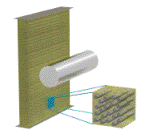Mechanical and Materials Engineering, Department of

Department of Engineering Mechanics: Dissertations, Theses, and Student Research
Date of this Version
Fall 12-2013
Document Type
Thesis
Citation
Vogeler, J. G. (2013). Kolsky Bar Experiment for High-Rate Large Deformation of Polycarbonate. Masters thesis, Univeristy of Nebraska-Lincoln, Department of Engineering Mechanics.
Abstract
Polycarbonate (PC) is a tough, transparent engineering thermoplastic. Its impact strength and ability undergo large plastic deformations without shatter make PC an ideal protective material for impact-resilient eyewear, aircraft windows and transparent armor. A good understanding of the response of this material to large deformations at high strain rates is critical for its utilization in these applications. To this end, a striker-less Kolsky bar device is employed in this work for the needed material characterization. The apparatus allow impulsive torsion and/or compression loadings with pulse durations sufficiently long for the plastic flow behavior to develop fully. Three new testing techniques based on the device are developed and applied to measure the response of PC to large plastic deformations of various modes at various strain rates and under various temperatures.
The first new technique is a modified torsional Kolsky bar method that loads the PC sample in high rate of simple shear. In addition to measuring the shear stress as the conventional method, the new technique also measures the axial stress induced by shear deformation. The measurements show that the material expands as it undergoes elastic shear and contracts as the shear becomes increasingly plastic. The results for the elastic response confirm the prediction by a non-linear elastic model for PC.
The second new technique applies a static axial compression to the sample before dynamic shear loading. The experiments with this technique seek to determine if and to what extent the deviatoric yield and flow stresses of PC are affected by the volumetric stress. For the stress states examined, both the deviatoric yield and flow stresses show linear dependence on the compressive volumetric stress.
The final Kolsky bar technique developed uses a friction clamp to store and release a compressive pulse. This new technique allows for loading pulses that are much longer than the achievable pulses in the traditional split Hopkinson bar tests. They are sufficient for the material flow behavior to develop fully in the compressive strain rate range of mid hundreds to lower thousands per second. Tests with the technique are performed on PC over an array of temperatures and strain rates. The temperature and strain rate dependences of the yield and flow stresses under dynamic compression are studied. The volumetric stresses are considerably more intense for the compression tests than for the torsion tests and combined compression-torsion tests. The data from the three types of tests together indicates consistent pressure-dependent increases in the deviatoric yield and flow stresses of PC subjected to high-rate large deformations.
Advisor: Ruqiang Feng
Included in
Applied Mechanics Commons, Engineering Mechanics Commons, Mechanics of Materials Commons, Polymer and Organic Materials Commons


Comments
A thesis Presented to the Faculty of The Graduate Studies College at the University of Nebraska In Partial Fulfillment of Requirements For the Degree of Master of Science, Major: Mechanical Engineering and Applied Mechanics, Minor: Industrial Management Systems Engineering, Under the Supervision of Professor Ruqiang Feng. Lincoln, Nebraska :December, 2013
Copyright (c) 2013 Jason G. Vogeler